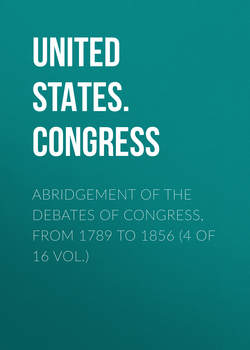Читать книгу Abridgement of the Debates of Congress, from 1789 to 1856 (4 of 16 vol.) - United States. Congress - Страница 113
ELEVENTH CONGRESS – SECOND SESSION. BEGUN AT THE CITY OF WASHINGTON, NOVEMBER 27, 1809.
PROCEEDINGS IN THE SENATE
Tuesday, December 5
ОглавлениеThe British Minister
Mr. Giles, from the committee appointed on the first instant, reported in part the following resolution; which was read the first time, and passed to the second reading:
Resolved, by the Senate and House of Representatives of the United States of America in Congress assembled, That the expressions contained in the official letter of Francis James Jackson, Minister Plenipotentiary of his Britannic Majesty near the United States, dated the 23d day of October, 1809, and addressed to Mr. Smith, Secretary of State, conveying the idea, that the Executive Government of the United States had knowledge that the arrangement lately made by Mr. Erskine, his predecessor, on behalf of his Government, with the Government of the United States, was entered into without competent powers on the part of Mr. Erskine for that purpose, were highly indecorous and insolent; that the repetition of the same intimation in his official letter dated the 4th of November, 1809, after he was apprised, by the asseveration of the Secretary of State, that the Executive Government had no such knowledge, and that if it had possessed such knowledge such arrangement would not have been entered into on the part of the United States, and after also being officially apprised that such intimation was inadmissible, was still more insolent and affronting; and that, in refusing to receive any further communications from him in consequence of these outrageous and premeditated insults, the Executive Government has manifested a just regard to its own dignity and honor, as well as to the character and interest of the American people.
That the letter signed Francis James Jackson, headed "Circular," dated the 13th of November, 1809, and published and circulated through the country, is a still more direct and aggravated insult and affront to the American people and their Government, as it is evidently an insidious attempt to excite their resentments and distrusts against their own Government, by appealing to them, through false or fallacious disguises, against some of its acts; and to excite resentments and divisions amongst the people themselves, which can only be dishonorable to their own characters and ruinous to their own interests; and the Congress of the United States do hereby solemnly pledge themselves to the American people and to the world to stand by and support the Executive Government in its refusal to receive any further communications from the said Francis James Jackson, and to call into action the whole force of the nation if it should become necessary in consequence of the conduct of the Executive Government in this respect to repel such insults and to assert and maintain the rights, the honor, and the interests of the United States.
Privileges of Foreign Ministers
Mr. Giles, from the same committee, also reported the following bill, which was read and passed to a second reading:
A bill to prevent the abuse of the privileges and immunities enjoyed by Foreign Ministers within the United States.
Be it enacted, &c., That if any foreign Ambassador, Minister, or other person, entitled to enjoy within the United States the privileges and immunities of a foreign Minister, shall have committed, or may hereafter commit, any such act as by the laws and usages of nations would justify the President of the United States in ordering such offending Ambassador, Minister, or other person as aforesaid, out of the District of Columbia, or out of the Territories of the United States; or in sending him home to his Sovereign, or to some place or territory within his Sovereign's jurisdiction; in every such case where the President of the United States shall deem it proper and expedient to exercise his constitutional authority, in either of these respects he shall be, and is hereby authorized and empowered to cause a warrant to be issued and signed by the Secretary of State, directed to any civil officer of the United States, authorized to serve process, or any military officer under the authority of the United States, commanding him to provide for and enforce the departure of such Ambassador, Minister, or other person offending as aforesaid, taking due precautions to avoid improper or unnecessary violence in executing such warrant. And all officers, civil and military, under the authority of the United States, are hereby required and enjoined to be obedient to such warrant. And in case any officer, civil or military, to whom such warrant shall be directed, shall fail, or unreasonably delay to execute the same, every officer so offending shall be deemed guilty of a high misdemeanor, and shall be punished by fine and imprisonment before any court of the United States having cognizance of the offence. Provided, That the fine shall not exceed – dollars, nor the imprisonment be for a longer time than – years.
Mr. Giles gave notice that he should call for the consideration of this subject on Thursday next.
